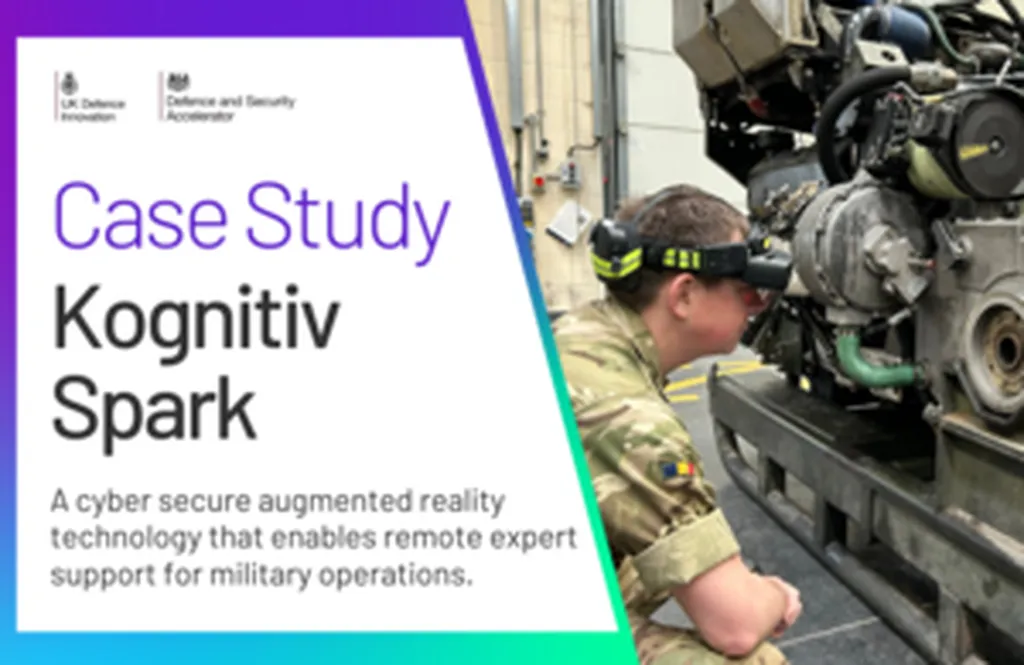In a groundbreaking development for military operations, Kognitiv Spark, a pioneering augmented reality (AR) technology firm, has deployed a cyber-secure AR solution that enables remote expert support for defence personnel. This initiative was made possible through funding from the Defence and Security Accelerator (DASA), part of UK Defence Innovation (UKDI). The project, supported by the Defence Technology Exploitation Programme (DTEP), has not only enhanced military capabilities but also fostered strategic partnerships within the defence sector.
Kognitiv Spark’s AR technology allows technicians and engineers in the field to connect with remote experts worldwide using AR headsets. This real-time collaboration includes sharing audio-visual feeds, PDF documents, and capturing annotated photos, all while maintaining stringent military-grade security. The technology has proven invaluable in scenarios where immediate expert intervention is critical, significantly reducing downtime and operational delays.
The impact of this technology is profound. For instance, a military technician in Estonia facing equipment malfunctions can now receive step-by-step guidance from a specialist located thousands of miles away in the UK. This capability ensures that critical equipment can be repaired and returned to service within hours rather than days, thereby enhancing operational readiness and efficiency.
Kognitiv Spark, founded in 2016, has a clear mission: to enhance worker capabilities through AR remote support without replacing human expertise. The company, which employs 25 people across the UK, US, and Canada, specialises in connecting field workers with remote experts using hands-free AR technology. Their approach, which integrates cybersecurity and defence at its core, has been pivotal in securing defence applications where security is paramount.
The collaboration with UKDI-DASA began in 2022 through the DTEP programme. The project aimed to develop and deploy secure AR technology across defence services, focusing on secure-by-design principles to meet the Ministry of Defence’s (MOD) stringent security requirements. This initiative not only advanced the technology but also exposed it to a broader array of users within the defence sector, facilitating feedback and refining its applications.
The AR technology’s versatility allows it to be deployed in various environments, from workshops and power plants to military field operations. Its ability to operate on low-bandwidth connectivity makes it particularly valuable in challenging operational environments where network capacity is limited. This capability ensures that defence personnel can access expert support and training regardless of their location, thereby improving efficiency and knowledge sharing across operations.
UKDI-DASA funding has enabled Kognitiv Spark to form significant partnerships with major defence organisations, including Rheinmetall MAN Military Vehicles (RMMV), Rheinmetall BAE Systems Land (RBSL), and MSI Defence Systems. These collaborations have led to the integration of Kognitiv Spark’s technology into defence operations, providing remote support capabilities that enhance operational efficiency and knowledge dissemination.
The DTEP project also addressed one of Kognitiv Spark’s most significant technical challenges: deploying their SparkOps application on secure sovereign defence cloud infrastructure. Working with Serco, a higher-tier supplier, and Prolinx, an SME specialising in secure sovereign cloud solutions, Kognitiv Spark successfully deployed their system on a secure MOD network. This achievement underscores the technology’s robustness and readiness for defence applications.
The success of the DTEP project has catalysed additional Army Innovation initiatives, including ARPAI (Augmented Reality Pan Army Implementation Plan) and PJ ESART (Project Equipment Support using Augmented Reality). These initiatives explore the broader applications of AR technology within the military, further solidifying its role as a core capability.
Adam Clay, Managing Director, UK & EMEA, Kognitiv Spark, reflects on the journey: “For innovation to succeed in defence, you need three things aligned: user demand, senior leaders who will champion it, and a sustained funding line. Without all three connected, even excellent projects hit a cliff edge and can’t continue.” The UKDI-DASA funding provided the necessary support to test and prove the technology’s viability, leading to greater exposure within the MOD and the defence supply chain.
Kognitiv Spark’s journey exemplifies how strategic support can transform innovative ideas into practical solutions that strengthen defence capabilities. Their success story highlights the importance of fostering collaboration between small, agile companies and defence organisations to drive innovation and enhance military readiness. As the company continues to develop relationships across the defence ecosystem, it represents the innovative spirit that UKDI-DASA funding is designed to nurture, turning great ideas into reality and building sustainable UK businesses.

